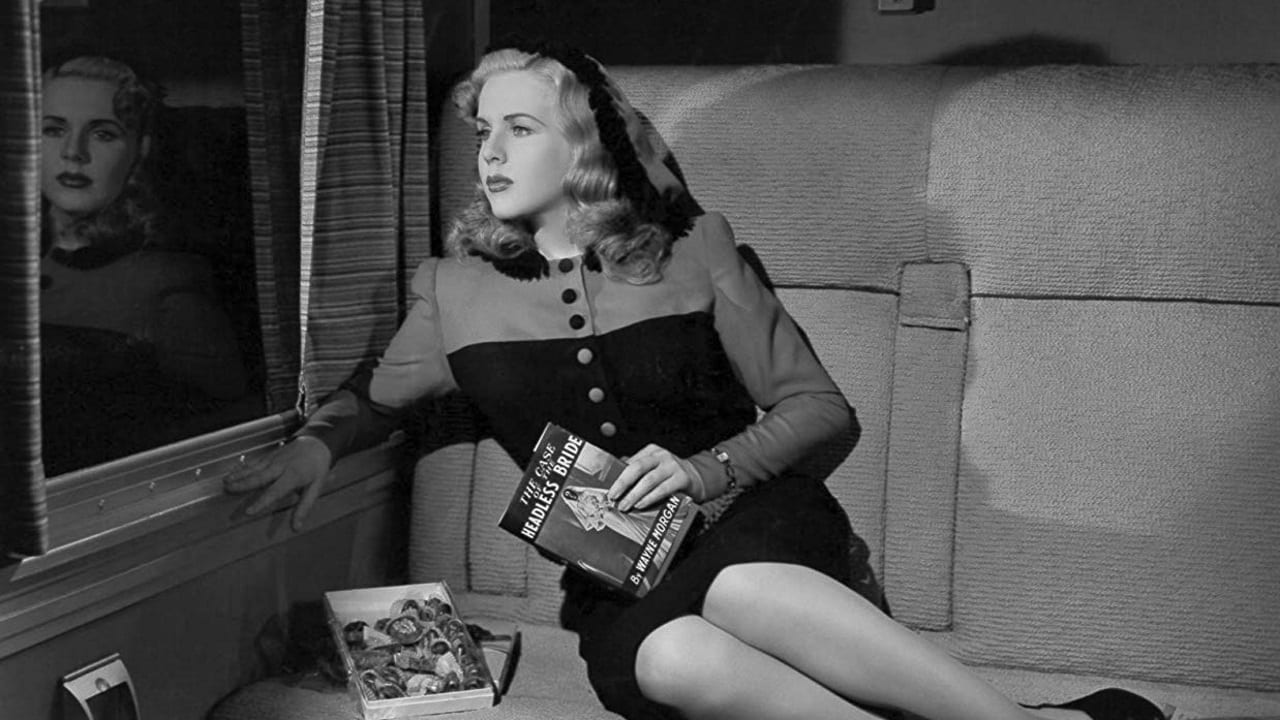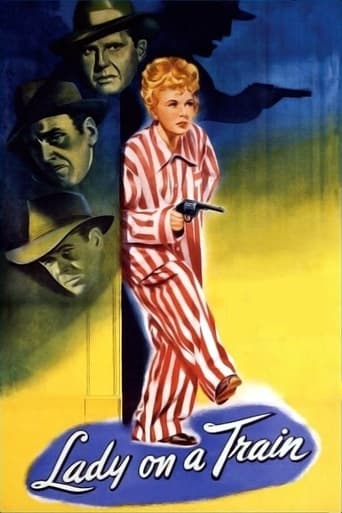

Deanna Durbin (Nikki) is an avid murder mystery fan. She reads all the books and her favourite author of the moment is David Bruce (Wayne). While riding on a train and engrossed in yet another murder story, she witnesses an actual murder as her train passes by an apartment. On arriving at the station, she goes to report it but the police dismiss her. She seeks out Bruce, and together they embark upon solving the case.It's a film that promises more than it delivers given the cast. It's too complicated at times as there are too many characters and the film is completely unbelievable. You definitely have to suspend belief which ruins things for me. No way would any of this happen. Still, Durbin is OK as she leads us through things and we get a twist at the end. It's all done as a comedy which is a pity. It could have been a more powerful effort if played straight. And I regret to say that Durbin sings 3 songs – atrociously, of course.It's OK if a little disappointing. Not as good as her comedies with Charles Laughton – "It Started With Eve" (1941) and "Because of Him" (1946) or her film noir effort "Christmas Holiday" (1944) in which she actually sings a good song! She's likable in this but you can skip it. And Edward Everett Horton's schtick really drags.
... View MoreA woman witnesses a murder through the window of her train and enlists a hacky mystery novelist to help her solve the case. Comic noir is usually not my bag, but I found this one a lot of fun. I liked Durbin much better here than in Christmas HOLIDAY... her singing voice isn't that great (and her rendition of "Silent Night" is shoehorned into the story in the most awkward way) but she has some pretty good comedy chops. The enjoyable supporting cast includes David Bruce, Ralph Bellamy, Dan Duryea and the always delightful Edward Everett Horton. Duryea is an actor who took me a long time to warm up to, but he works really well in this setting. I'd like to see him in more comedies. The movie isn't incredibly funny, but it is amusing and moreover, the script does a good job of blending the humorous and the crime thriller. One crummy rear projection shot notwithstanding, it's surprisingly well photographed, with some terrific images and fine use of lighting. Does it explore the darkest depths of humanity or knock you over with hard-boiled realism? No, in fact a lot of it is really implausible. But as light entertainment, it hits the spot nicely and sports some clever construction.
... View MoreDeanna Durbin had one of the best singing voices in movies in the 1940s, and a pleasing personality. She did make some good films like "It Started With Eve" and "Can't Help Singing", but most of her films have gone into a kind of eclipse which is hard to understand. Her one time film partner Judy Garland (in the short "Every Sunday") is recalled by her myriads of fans to this day for her records, her concerts, and her films. So is Mario Lanza, and he made far less movies than Durbin. But she got married, retired from movies as a regular profession (occasionally doing a voice over or a song), and became very contented. A far better fate, perhaps, than Garland's or Lanza's. The problem was the choice of vehicles for her. She did luck out on a few films, but most did not have the care that Garland's best work at MGM had.This 1945 film was really unique, as it was a murder mystery that tried to keep you guessing until the end who was the murderer. Dearbin is returning by train to Grand Central Station, and while passing through the lofts of the upper East West Side of the Manhattan of the middle 1940s she sees the apparent murder of an elderly gentleman by a person whose back is towards her. She tries to get the train to stop so others can see what she saw, but the people who come in don't see a life and death struggle going on.Yet two days later Durbin is reading the newspaper and sees an item about the death of a major businessman (Thurston Hall). She starts investigating this death, and finds that his two nephews are his heirs. The nephews (Dan Duryea and Ralph Bellamy) start being questioned by Durbin, but she is not sure which of them (if either) is the guilty party. Duryea acts like his typical untrustworthy hedonist, and Bellamy acts like someone who would just like to be of assistance.There are some moments for singing, of course. One funny one is when Durbin is alone in her apartment except for Allan Jenkins, one of the villain's henchmen. Jenkins just has to pick up some piece of evidence in Durbin's bedroom, to get rid of it. He has managed to get inside, but she is on the telephone. He starts thinking seriously of killing her, but hears her singing a very sentimental ballad over the telephone. From time to time we see it does affect him as he listens carefully. Finally Durbin hangs up, and leaves the room (so that Jenkins can leave the house unobserved). He does, but not before blowing nose quite hard. It's rare to see Jenkins so moved.It is a cute little thriller - comedy. Nothing spectacular, but it was a change of pace for Durbin, trying to be Nora Charles.
... View MoreDeanna Durbin made many movies, mostly bad. But the ones that are good make all the others palatable, including "Lady on a train". She was a unique personality. Almost impossible not to like. For example, It's like watching John Wayne walk through one boring, formulaic plot after another and not minding because you just like John Wayne. So to be thoroughly charmed by Deanna Durbin, you have to inoculate yourself against the dumb plots she was given later in her career. First dose should be with one of the best stories. "It started with eve" That should win you over for anything to come later. Then it's good to go to the beginning, her first picture, "Three Smart Girls" when she was a little girl and won everyone's hearts ( but be warned the story and direction are bit creaky). Your third dose should be "Three smart girls grow up" by this time your ready to take on and enjoy any of her movies regardless of plot. I do admit to fast-forwarding past some of her singing in her later movies, but that's because they're badly placed in the story and tend to slow things down to a crawl. Bottom line, she's something special and not to be missed.
... View More